Legends: Jaberi Bidandi Sali
As a deputy mayor of Kampala City Council in 1964, he was instrumental in the construction of Uganda Commercial Bank building, now Cham towers
Fact file
- Born in Banda in 1937 to Bumaali Kakonge and Erioth Bulyaba.
- Attended Lugala Primary School, Budde Primary School, Kibuli Primary School, Kibuli Junior and Nyakasura School.
- Joined Punjab Agricultural College, Lahore University in Pakistan (1958), to pursue a Bachelor of Agriculture degree, but did not graduate.
- Returned home to join UPC as the general secretary of Buganda region (1963-65)
- Married to Susan for 40 years, they have 12 children.
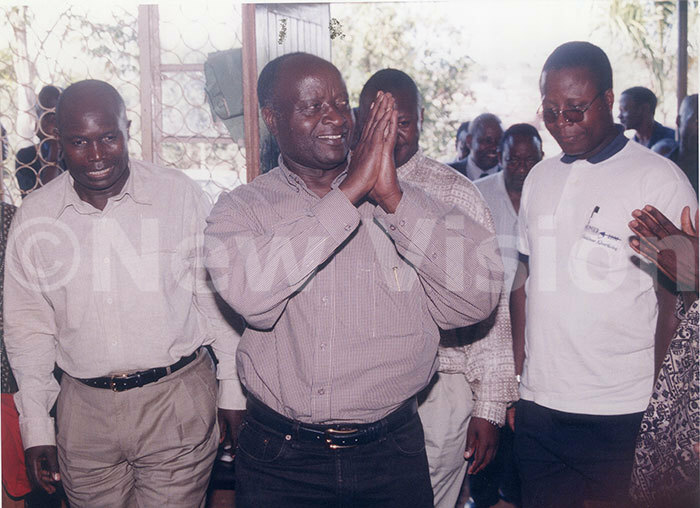 Local Government Minister, Bidandi Ssali (c) with Kawempe Councillors at Makerere Primary School at a political rally for the movement system. 14.05.00
Local Government Minister, Bidandi Ssali (c) with Kawempe Councillors at Makerere Primary School at a political rally for the movement system. 14.05.00
Starting out as a Uganda People's Congress (UPC) mobiliser in 1962, Bidandi, mentored by the likes of Kintu Musoke, Dan Nabudere, John Kakonge, Cuthbert Obwangor and Milton Obote. He went on to attract Ugandans' passion to the extent that in him, many saw, and still see, a future president. But if he was ever going to be president via the NRM party, then the closest Bidandi came was second NRM vice-chairman, behind Alhajji Moses Kigongo, just before an incredible fall-out in 2005.
At a Movement high-level meeting in 2001, it was agreed that Museveni retires in 2006, having served out the constitutionally mandated five-year term twice. "Museveni had accepted (to stepdown after 2006)," says Bidandi. "It was even reflected in his (and NRM's) 2001 manifesto." Privy to this information, Bidandi asked Ugandans to ‘see-off' Museveni by voting him President for the last term. "I had taken his (Museveni's) word seriously, so I fervently campaigned for him," says Bidandi.
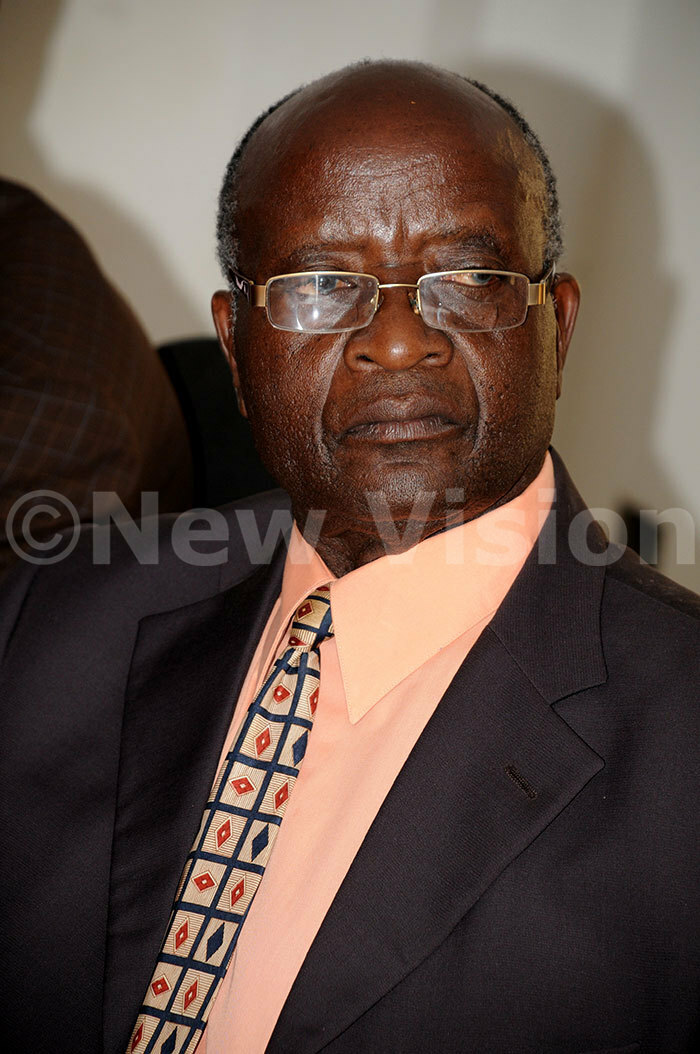 Bidandi Ssali Jaberi
Bidandi Ssali Jaberi
Bidandi's fall-outs
Bidandi is no stranger to fall-outs. Having introduced UPC in Buganda, he was key in breaking up the UPC-Kabaka Yekka (KY) alliance, launching the party's first branches under Paul Muwanga and Godfrey Binaisa against an accord that barred UPC from opening-up branches in Buganda.
Bidandi saw the UPC-KY alliance as being against Buganda as it meant the region was not represented in the party's top rungs.
In 1980, Bidandi disagreed with Museveni, the then UPM flag-bearer in the 1980 general elections, over going to the bush to oust Obote's government. There are accusations by some NRM/NRA leaders that Bidandi refused to assist them when they contacted him, while they were in the bush.
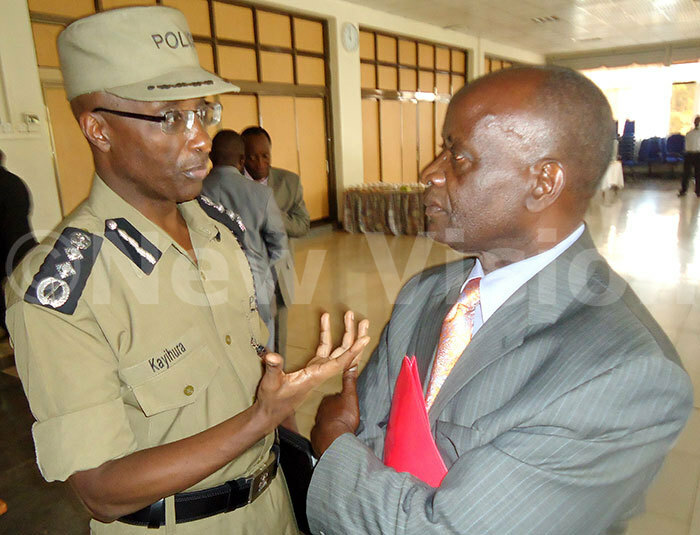 Kale Kayihura speaks to Bidandi Ssali 7.09.2010
Kale Kayihura speaks to Bidandi Ssali 7.09.2010
Although Bidandi had quit UPC, he maintained close links with Paul Muwanga, the then vice-president and minister of defence, who actively spearheaded the counter-insurgency operations against NRA. "That was my first breaking point with Museveni," Bidandi concedes, although it didn't stop him from serving as a minister in Museveni's government.
He also served under Tito Okello Lutwa in 1985. With this background, his ideological fall-out with Museveni was not surprising. Having publicly opposed the removal of presidential term limits in 2005, the end of the road lurked for Bidandi.
Because of his stand, there were reports of an unsuccessful resolution in the NRM national council to kick Bidandi out of the NRM, but he sent his resignation to Museveni to preempt his expulsion.
Bidandi never contested in the 2006 presidential elections against wide speculation. After a prolonged spate of sweet talking by opposition parties, Bidandi finally joined and was elected interim chair of the Uganda National Movement, then led by former Makerere University Vice-Chancellor, Prof. Venansius Baryamureeba. The party was later transformed into People's Progressive Party (PPP) with Bidandi as chairman.
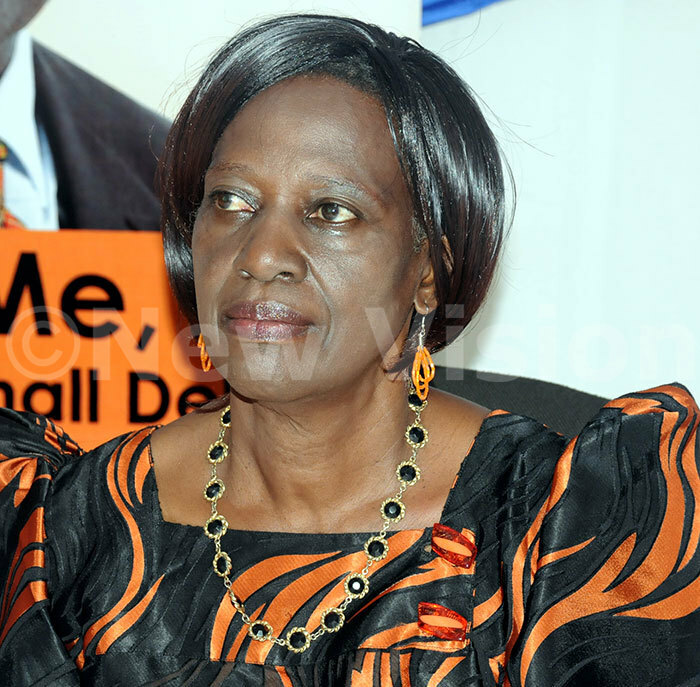 Suzan Ssali, Bidandi's wife
Suzan Ssali, Bidandi's wife
Achievements
Dr. Kisamba Mugerwa, the former National Planning Authority boss and a former agriculture minister, notes that Bidandi is a peace-maker who distinguished himself during his tenure as local government minister. "He is one man I know who always looks for peaceful means and discussions. He left a clean record wherever he went," observes Mugerwa.
As a deputy mayor of Kampala City Council in 1964, he was instrumental in the construction of Uganda Commercial Bank building, now Cham towers and KCCA headquarters (City House) then named "White House".
As a football enthusiast, he was key in starting KCC FC as a social football club in 1964, before it joined the elite league in the 1970s where he went on to be its manager (1974-1979).
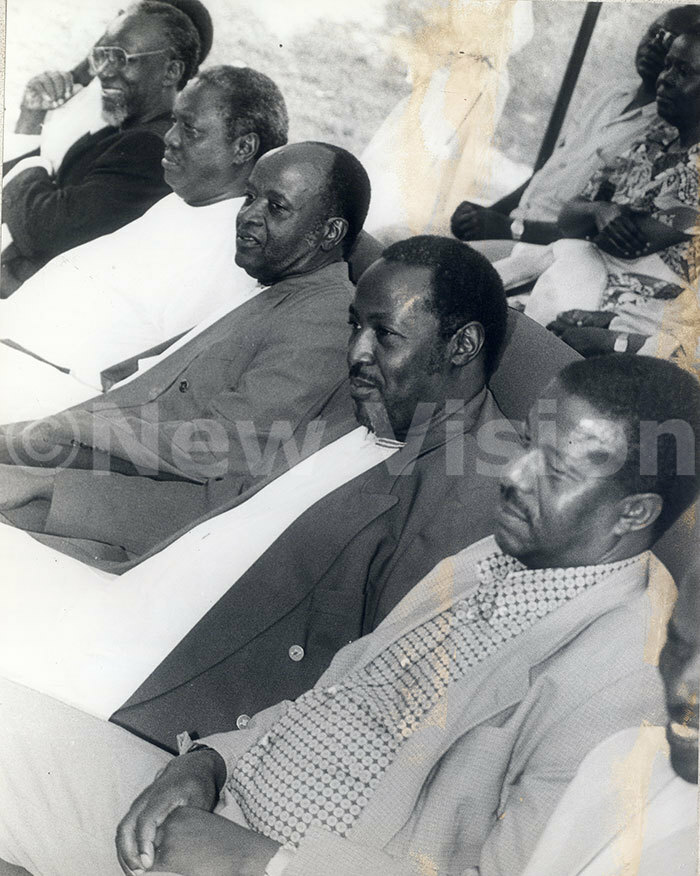 (L-R) Kirunda Kivejinja, Kintu Musoke, Bidandi Ssali, Moses Kigongo & Amanya Mushega at Bidandi's daughter's residence 25.07.98
(L-R) Kirunda Kivejinja, Kintu Musoke, Bidandi Ssali, Moses Kigongo & Amanya Mushega at Bidandi's daughter's residence 25.07.98
Bidandi also prevailed over the most successful Uganda Cranes team that reached the 1978 African Nations Cup finals, losing 2-0 to Ghana, a feat that has eluded the national team since then.
Bidandi was also central in forming the Uganda People's Movement which carried the objectives of Uganda National Liberation Front in 1979, serving as its secretary-general.
As the first local administration minister (1979- 1980), Bidandi is the only minister in Uganda's history to appoint over 20 MPs who didn't join Museveni's bush war to the national consultative council.
Bidandi built the decentralisation policy into legal format and constitutionalized it during the Constituent Assembly and implemented it as local government minister (1989-2004).
Alongside Alhajji Kigongo, Bidandi superintended the writing of the NRM-O Constitution and registering it as a political organisation in 2000.
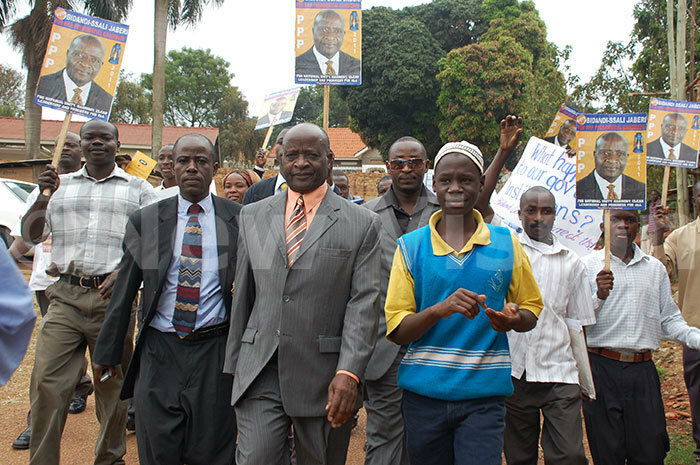 PPP Chairman, Bidandi Ssali escorted by supporters for nomination 09.02.10
PPP Chairman, Bidandi Ssali escorted by supporters for nomination 09.02.10
Bidandi also served as electoral commissioner (1979), director of Uganda Development Corporation, Uganda Electricity Board, Uganda Commercial Bank, Nakawa MP (till 2006), minister of labour (1986-87) and energy (1987-89) in a career spanning over 40 years.
Upon leaving the cabinet in 2004, Bidandi graduated with a bachelor's degree in local governance and human rights at the Uganda Martyr's University in 2011.